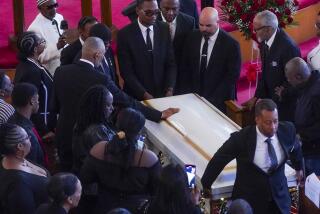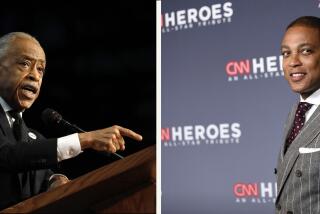Sharpton Often Dazzles but Also Disappoints
NEW YORK â The Rev. Al Sharpton was scarcely out of his overcoat and into his speech at a medical school on the Upper East Side when praise began ringing out across the auditorium.
When the Democratic presidential candidate pronounced his disdain for âNegro amnesiaâ -- an affliction of African Americans who forget their roots -- the room full of black psychiatrists and professionals laughed in agreement. âMmm-hmm ... Come on!â When he pummeled President Bush for spending more to revitalize downtown Baghdad than downtown America, dozens raised their voices in affirmation. âThatâs right, Rev!â
By the time Sharpton finished, most of the 250 men and women in the room were on their feet, applauding.
Then a curious thing happened. After posing for a few snapshots and shaking four or five hands, Sharpton ducked out the door. This was a paid speaking engagement, he explained later, not the place for political appeals. So the Brooklyn minister left, without calling for volunteers, without appealing for campaign donations, without asking for a single vote, from a group that seemed ripe for the asking.
On the campaign trail, an insurgent such as Alfred C. Sharpton Jr. canât be expected to follow the rules. His goal, after all, is not so much to win the Democratic presidential nomination as to continue his slow climb from a master of confrontational street theater into a national spokesman for minorities and the poor. At times, he has moved nimbly toward that goal. He has been so witty and incisive in debates with his eight Democratic rivals that he has been widely acclaimed in the mainstream media as Campaign 2004âs resident provocateur.
He insisted that Connecticut Sen. Joe Lieberman say whether he would negotiate with Palestinian Authority President Yasser Arafat. (Lieberman said he would not.) He slapped Democratic front-runner Howard Dean of Vermont for once equivocating on affirmative action and for âsounding more like Stonewall Jackson than Jesse Jacksonâ when he appealed to Southern voters with Confederate flags on their pickup trucks.
And he has kept his opponents and audiences laughing. When Sen. John F. Kerry of Massachusetts took a tumble after last monthâs Detroit debate, Sharpton didnât miss a beat: âI saw Lieberman push him!â
Yet Sharpton has reached less than 5% in most national polls and his ânegativeâ ratings remain higher than any other candidate. He shortcuts meetings with some voters and -- after a change of campaign managers -- has only begun building the sort of grass-roots organization that would seem to be a street activistâs metier.
Does it matter?
It does to those who believe Sharpton has a chance of at least approaching the performance of the Rev. Jesse Jackson, another African American preacher, who changed the dynamics of presidential politics in 1984 and 1988. By winning several primaries and building a wide coalition that included support from black and white voters, Jackson assured an African American voice inside the Democratic establishment. Jacksonâs strong showings and riveting 1984 convention speech (âKeep hope alive!â) proved a black candidate could not be ignored.
Sharpton has said that Jacksonâs campaigns set an example for success: âHe did more in not being elected than some people have in winning.â But that groundbreaking fervor is nearly two decades old and probably canât be regained by Sharpton in 2004, political experts say.
âJacksonâs campaign in 1984 was more of a movement, with almost a religious zeal to it,â said Vincent Hutchings, an associate professor of political science at the University of Michigan. âThe novelty of an African American running for president is not so pronounced anymore.â
In one recent week, candidate Sharpton skipped his only political event. He spent his time preaching, delivering a eulogy, making fund-raising calls and holding campaign meetings. When asked the nature of the meetings, he replied, âNone of your business.â
On a Thursday night, the Broadway Democrats gathered in a Columbia University auditorium to hear about each of the nine presidential candidates. The neighborhood club had advertised Sharpton as the only contender who would appear in person. But just a few minutes into the meeting, Sharpton canceled, sending his lawyer as his surrogate. Several in the audience groaned. âI was really disappointed,â said Colin Blair, a 19-year-old religion student at Columbia, who wore a blue Sharpton T-shirt.
Later that night, Sharpton got only three votes in a straw poll of the tweedy, multiethnic club. Blair and his brother, who are white, said they are still primed to work for Sharpton, if only they can find an office where they can volunteer.
Sharpton also bobbled a meeting last spring with a group of African American political scientists in Oakland, charming some but alienating others.
The candidate finished his speech, then took almost no time to press the flesh or ask for guidance from the 200 black scholars in attendance. Several participants said the candidate missed what one called âa golden opportunityâ to recruit thoughtful, well-heeled supporters.
His behavior particularly alienated two young professors who helped coordinate the event. James L. Taylor, an assistant professor at the University of San Francisco, drove Sharpton across the Bay Bridge to San Francisco and said his guest barely responded as he tried to describe the social and economic malaise confronting poor Bay Area communities.
âPeople like Al Sharpton tragically disappoint you,â said Taylor, who is thinking of backing Dean. âYou think they can come out and represent the people, but instead of using their position for the people, they seem to use it for themselves.â
Sharpton became angry on being told last week of the complaints. He said he left the Oakland event quickly because he had to attend a meeting with antiwar protesters in San Francisco. And he said he had been specifically asked not to make political appeals to the group, which might threaten its nonprofit status. Sharpton said that after a career of being chided as being too political, he was perplexed to now hear that he had not been political enough.
âThis all sounds very trivial to me,â Sharpton said.
He and his campaign say there have been no shortage of instances when he has brought comfort and inspiration to people heâs met.
Indeed, on a warm Saturday in South Carolina this month, Sharpton drove down a narrow country highway -- dotted with the occasional Confederate flag and fluffy white remnants of the cotton harvest -- to console the family of Army Spc. Darius T. Jennings. Inside a packed high school gymnasium, Sharpton eulogized the 22-year-old soldier, killed when his helicopter was shot down in Iraq.
âEverybody loved the service,â Elaine Johnson, Jenningsâ mother, said later. âPeople are still talking about it. Young children are talking. It gave them some direction in their life.â
African American audiences like the one at the service in Cordova, S.C., welcome Sharpton like a visiting celebrity. No one seems to talk about his past, or Tawana Brawley, the black teenager who claimed in 1987 that she was raped by six white men. Sharpton was an advisor to the girl.
Sharpton remains unapologetic about his support of the 15-year-old, despite a grand juryâs ruling that the case was a hoax and despite his payment of a $65,000 judgment for defamation -- falsely accusing a New York prosecutor of participating in the alleged attack. âWe believed her story and represent her story and still do,â Sharpton told moderator Tom Brokaw during a televised debate in Iowa on Monday. âIâve never [advocated] a case that everybody believed in and everybody agreed with. And Iâm willing to pay the penalty for what I believe.â
Much has been made of the new âRev,â as Sharpton is known -- the one who lost the James Brown hairdo and replaced loud sweatsuits and gold medallions with pinstripes. Although he has toned down his image, Sharpton insists he will never give up his agenda -- stopping the war in Iraq, controlling guns, establishing universal health care and launching an enormous public works program to create jobs. He plans to tout those issues at the Democratic National Convention in July.
âI plan to be speaking in prime time,â Sharpton said. âThey can decide whether thatâs inside the hall, or out in the parking lot somewhere.â
But political professionals say Sharpton cannot rely solely on his powerful voice to help convince voters and get them to the polls -- particularly in early Democratic contests such as South Carolina and Michigan where Jackson did well.
He is still looking to find a replacement to energize his South Carolina campaign, after his first coordinator there quit. In Michigan, a Detroit campaign office is finally about to open.
Sharpton campaign manager Charles Halloran said he found a campaign woefully disorganized when he took over last month.
âWe are now trying to worry about the basics,â such as opening campaign offices and raising more money, Halloran said.
As of Sept. 30, Sharpton stood last among the Democrats in fund-raising, with $258,729 collected this year and just $24,070 in his treasury.
Jackson himself has not endorsed anyone in the presidential race and has steered a broad course around his onetime protege -- who once led a Jackson program that boycotted retailers deemed unfair to African Americans.
The two talk, but mainly about personal matters. The Rainbow-PUSH Coalition leader has signaled that he favors a candidate with a real chance of beating Bush.
Some see in the cool relationship between Jackson, 62, and Sharpton, 49, a generational rift, typical when a younger leader strives to take the torch from his predecessor.
âHe has done very well in the debates. He has such a good mind and a real grasp of the issues,â Jackson said in an interview, declining to judge Sharptonâs campaign as a whole.
âI do not know very much about his infrastructure or his fund-raising, which are so key to a campaign.â
Sharpton insists he can make himself heard, as Jackson did, helping to register 2 million voters before the 1984 election and swaying the Democrats, for instance, toward a tougher stand against apartheid in South Africa.
Preaching since age 4, Sharpton is confident he has the voice. It was the voice that coaxed the black professionals out of their chairs in New York, whooping, as Sharpton preached on the beauty of Ray Charlesâ âAmerica the Beautiful.â
âIt occurred to me that Ray wasnât singing about anything he knew,â Sharpton said, pausing to let each line sink in. âBecause Ray has never seen no purple mountain majesties. Ray has never seen no fruited plain.... Ray is blind. Ray was singing what he believed.
âAnd it occurred to me that all African Americans have some Ray Charles in them. We never fought for an America we knew. We fought for an America that we believed in ...
âWe can make America beautiful. If we try.â
More to Read
Get the L.A. Times Politics newsletter
Deeply reported insights into legislation, politics and policy from Sacramento, Washington and beyond. In your inbox three times per week.
You may occasionally receive promotional content from the Los Angeles Times.











